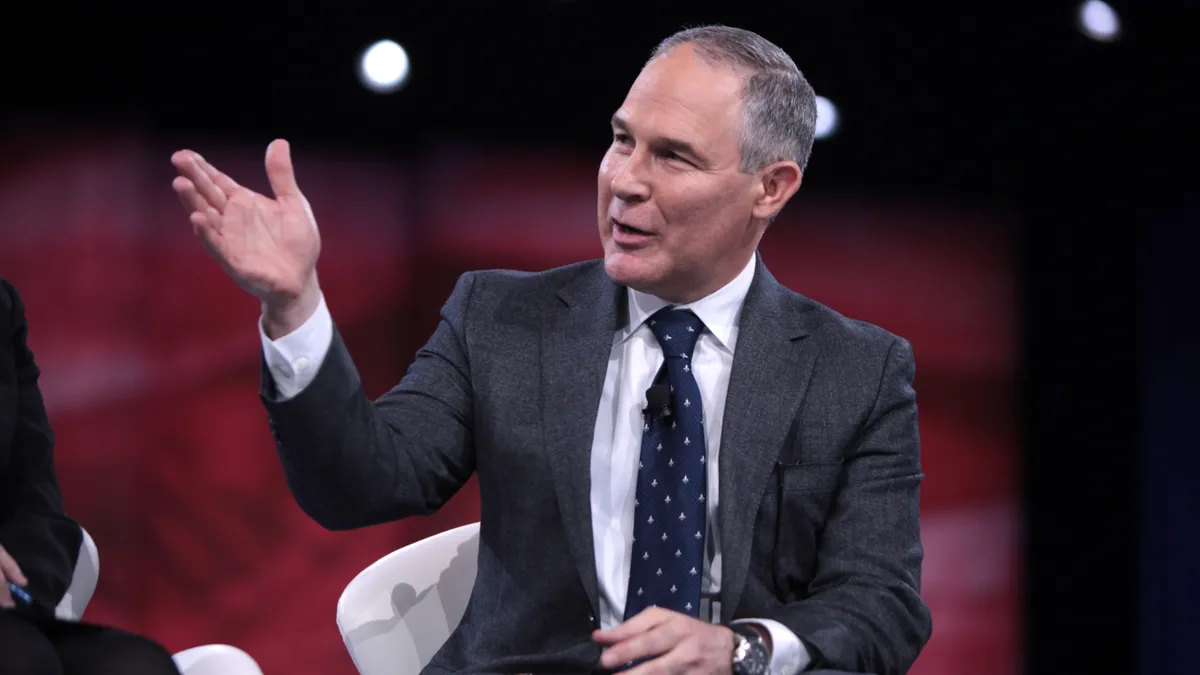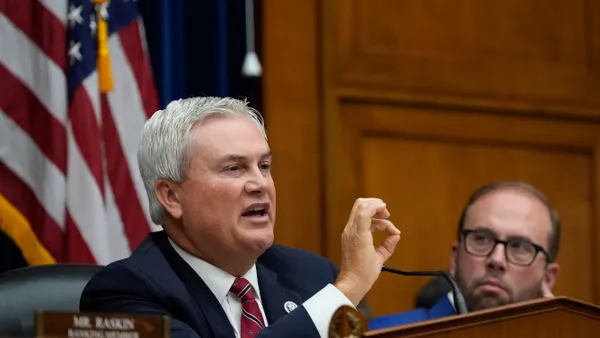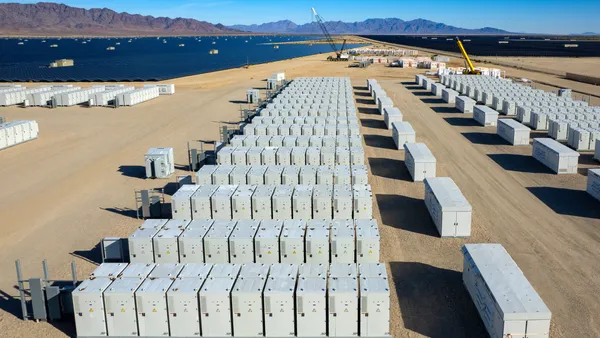Dive Brief:
-
Republicans on the Senate Committee on Environment and Public Works defied a Democratic boycott to approve the nomination of Oklahoma Attorney General Scott Pruitt (R) to head the U.S. Environmental Protection Agency.
-
Democrats, for the second day in a row, did not show up for the scheduled vote to protest a nominee they say is opposed to the EPA's mission. As a result, Committee Chairman Sen. John Barrasso (R-WY) suspended rules requiring two minority-party members be present, allowing Pruitt to be confirmed in an 11-0 vote.
-
The Senate Finance Committee used the same tactic earlier this week to push through President Trump's nominees to head the Department of the Treasury and the Department of Health and Human Services. The nominations will now head to the full Senate for final confirmation votes as early as next week.
Dive Insight:
On Thursday, President Trump’s controversial pick for the EPA moved closer to confirmation.
In a move Barrasso described as "extraordinary" for both sides, Democrats boycotted the vote for two days, leading Republicans to suspend the rules in order to push the nomination through.
"The people spoke and now it is time to set up a functioning government, and that includes a functioning EPA," Barrasso said at the hearing. "Elections have consequences, and a new president is entitled to put in place people to advance his agenda."
Republicans held off pushing the nomination through yesterday, taking the moment to excoriate the minority party for a lack of action. But Democrats would not relent, extending their protest of a nominee they say is an outright foe of the EPA's mission to protect the environment and human health.
As Oklahoma's Attorney General, Pruitt sued the federal EPA 14 times, challenging regulations from the Mercury and Air Toxics Standards (MATS) to the Cross State Air Pollution Rule and the Clean Power Plan.
In his confirmation hearing, Pruitt told lawmakers those court challenges did not indicate a belief that EPA should not regulate harmful pollutants like mercury or carbon, but that he disagrees agency's approach under the Obama administration. Asked by Sen. Dan Sullivan (R-AK) what his intent was in filing the lawsuits, Pruitt said they aimed “to restore the relationship and ensure the relationship that Congress intended with the states."
But Pruitt offered no plans for how his EPA would go about regulating pollutants under his banner of "cooperative federalism," leaving many Democrats skeptical that his agency would do more than simply cut EPA rules.
In a statement following the first day's boycott, Sen. Tom Carper (D-DE), the ranking minority member on the committee, said that Pruitt "has consistently misrepresented his environmental record and denied us the information we require to perform our duty to advise and consent."
Pruitt submitted answers to more than 1,200 lawmaker questions after his confirmation hearing, but Democrats said many of the answers were inadequate, including those regarding the nominee’s communications with outside groups during his time as AG.
In 2014, a New York Times investigation uncovered close communications between Pruitt’s and fossil fuel lobbyists, including an instance where his office copied an industry letter criticizing an federal methane rule and sent it to the EPA.
Pruitt and GOP members of the committee downplayed the issue, saying he was simply representing the interests of a key state industry. As the Republicans concluded the vote, Barrasso said complaints about Pruitt’s responses were "simply a smokescreen” as this was “the longest EPA nomination in history."
But Democrats said the findings were evidence of a regulatory approach prioritizes industry protections over addressing environmental issues like climate change.
Like Trump’s other energy nominees, Pruitt has broke with mainstream climate science, saying there is still “room for debate” over the causes. But in his hearing, the nominee called his personal opinion “immaterial” because the EPA has a legal obligation to regulate carbon under the Clean Air Act.
That obligation, however, is based on the EPA's 2009 endangerment finding, which holds that greenhouse gas pollution is a threat to public health and should be regulated. If the Trump administration views the science underlying that finding as illegitimate, it could seek to challenge it in court or push Congress to amend the underlying law.
Any court challenge would be an uphill battle, energy lawyers say, because Pruitt’s EPA would have to prove in court that GHGs are not a public health threat. But the nominee has shown appetite for the fight before, signing onto a legal challenge to the finding in 2012.
Though that suit was thrown out, the Trump EPA could have an advantage in future challenges due to judicial deference — the legal concept that courts should allow federal agencies wide leeway to make regulations, so long as they do not explicitly break the law.
The concept was one of the key points in the D.C. Circuit Court’s hearing on the Clean Power Plan last year, with a number of energy lawyers saying they expected the court to defer to EPA's authority on the plan.















